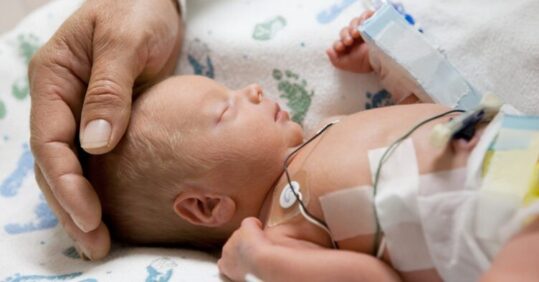Premature babies to receive six months’ protection against RSV in single injection

Vulnerable premature babies who need extra protection against respiratory syncytial virus (RSV) will be able to receive six months’ protection in a long-lasting single injection.
Nirsevimab – administered during care by a specialist neonatal team – will replace monthly injections of palivizumab previously offered to some babies.
Available from September, the injection can provide protection for around 5 months and so likely to be effective for the length of a typical RSV season.
Related Article: Advice on Guillain-Barré risk for adult RSV vaccine updated by MHRA
Clinical trial data has suggested more than 80% protection against the virus.
Nirsevimab will be offered seasonally to eligible high-risk infants and young children with complex heart, lung or weakened immune system conditions.
It is a long-acting monoclonal antibody – which supplies antibodies against RSV, rather than encouraging the body’s own immune system to produce them as with the usual vaccination programme. It works by binding long-term to the RSV fusion (F) protein, the route by which the virus enters a cell.
Babies born prematurely have a high risk of contracting RSV in their first winter, when their own immunity is low.
Dr Claire Fuller, co-national medical director for NHS England in the UK, said: ‘This injection will provide premature babies with a protective bubble against RSV just in time for the colder months.
Related Article: UKHSA warns of worrying rises in infectious diseases since Covid pandemic
‘It will offer a long-lasting defence helping to avoid unnecessary hospitalisations and serious illness — giving babies the best possible start in life and shielding them from harm.’
NHSE said that every year around 30,000 children under the age of five are hospitalised with RSV, and it causes around 30 infant deaths.
NHSE expects that health systems in Scotland, Wales and Northern Ireland will also offer nirsevimab from this autumn, meaning that around 9,000 babies and infants in the UK could benefit annually.
RSV infects 90% of children by the age of two and is one of the leading causes of hospitalisation. It can lead to life-threatening pneumonia and infant bronchiolitis.
Related Article: RSV vaccination sees 30% drop in hospitalisations in older people
Earlier this year, England’s RSV vaccination programme was found to have achieved a ‘significant’ reduction in hospital admissions among older people.

See how our symptom tool can help you make better sense of patient presentations
Click here to search a symptom


![Menopause: identification and management [NG23]](https://s3-eu-west-2.amazonaws.com/images.nursinginpractice.com/wp-media-folder-nursing-in-practice/wp-content/uploads/2025/03/PULSE-NIP-UPLOAD-BAYER-NICE-MENOPAUSE-A5-HANDBOOK.jpg)
